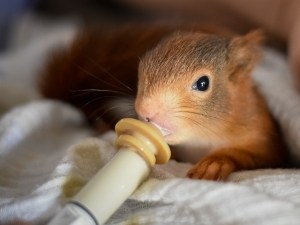
Animals are most vulnerable when they are babies, their weak little bodies can’t fight off illnesses as well as adult squirrel bodies can, in addition, they are easy prey for predators.
If you’re raising a baby squirrel, and it starts gasping for air, you’d be right to be worried. This article explores why this happens
Table of Contents
Baby squirrel gasping for air:
If a squirrel is gasping for air, while it’s feeding, then you have nothing to worry about. That is, as long as the squirrel is breathing normally when it isn’t feeding.
Gasping for air when feeding is normal behavior for these animals, they gasp when they’re having what is called a feeding seizure, this gasping is also called guppy mouth, a milk seizure, or a milk trance.
When baby squirrels feed they will try to get a good suck on the nipple that they’re feeding on. The baby squirrel will gasp if its mouth hasn’t suctioned the nipple very well.
This may be common baby squirrel behavior, but not all squirrels will do this.
Some squirrels will gasp while feeding and other squirrels won’t, so don’t be surprised if one or two of your squirrels do this and your others don’t. It isn’t a big deal and it isn’t dangerous for them.
The squirrel will eventually grow out of doing this. The gasping is a reflex specific to nursing so your baby squirrels will stop doing this once they are introduced to dry foods.
What to do when a baby squirrel is gasping for air:
If you can, you may need to get a different nipple to feed your baby squirrel with, the miracle nipple can help to stop the baby squirrel from gasping for air in this way.
If you can’t get the miracle nipple, try moving the nipple you have around the baby squirrel’s mouth and see if it’s able to latch onto the nipple placed at different angles.
Giving the squirrel a break by removing the nipple, and giving it back when it stops gasping, may also help the situation.
Shaking the nipple in the baby’s mouth may also help get it out of the seizure.
Gently tapping the baby squirrel on its nose may also help to get it out of this state and get it back to feeding.
Things to remember when feeding baby squirrels:
Although a feeding seizure isn’t a sign that the squirrel is choking, or aspirating, you still need to be patient and careful when you feed the animal to avoid this.
Always remember to feed the squirrel slowly and do not rush the feeding. Feeding slowly ensures that the squirrel doesn’t inhale the formula and aspirate it.
If the squirrel comes out of the seizure, feeds normally, then goes back into the feeding seizure, you don’t have to worry, this can happen too. You don’t have to worry as long as they don’t aspirate and you feed the animal slowly.
Avoid squirting formula into the squirrel’s mouth while it’s having a feeding seizure.
How do you know if a baby squirrel is aspirated?
You’ll know that the squirrel is aspirated if fluid starts to bubble at the squirrel’s nose or mouth.
A baby squirrel will aspirate if it breathes fluids into its lungs while feeding. Aspiration can easily happen if the squirrel is taking too much formula in at a time.
What to do:
If you realize that your baby squirrel is aspirating fluid then you’d need to quickly pull the nipple off of the baby’s mouth and tip the baby’s body foreword using gentle yet rapid forward motions.
Remember to support the squirrel’s head and body as you tip it over.
Allow gravity to drain the fluid from the squirrel’s nostrils and blot the squirrel’s nostrils to dry them off.
You can get back to feeding the baby once the fluids have drained from its nose, once the airways are clear, and once the baby is calm.
If the baby regularly aspirates fluids, then you’d likely need to feed the baby using a smaller syringe, use your thumb to press on the side of the plunger, or feed the baby using a nipple with a smaller hole.
If you enjoyed this article then you may also be interested in other squirrel related articles. Here are some articles that you may be interested in: Baby Squirrel Pneumonia Symptoms, Why Did My Squirrel Suddenly Die?

